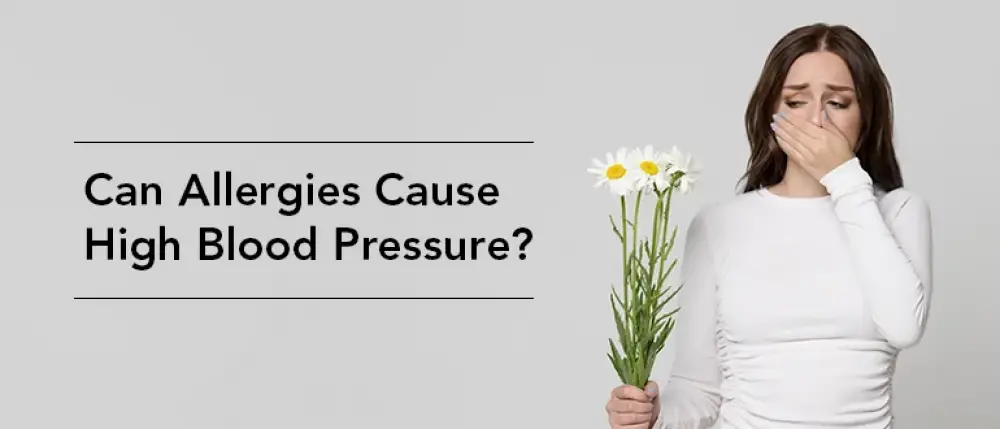Subscribe to get weekly insights
Always stay up to date with our newest articles sent direct to your inbox
Published on 3 Jul, 2024
Updated on 29 Mar, 2025
4423 Views
5 min Read

Written by Mudit Handa
favorite2Likes
One way to get high blood pressure is to go mountain climbing over molehills.”- Earl Wilson
A few decades back linking blood pressure and allergies would have been like linking a mountain with a molehill. However, recent research has found a potential connection between the two. They might seem unrelated, but blood pressure can be a repercussion of severe allergic reactions.
How?
Allergies happen when your immune system is triggered to release antibodies to fight back allergens or foreign particles which enter the body. It can be pollen, food, drink or even when you come in contact with some animals or plants. On the other hand, high blood pressure or hypertension occurs when the force of your blood on the arterial walls increases and the heart has to work overtime to circulate blood. Both seem to be happening in different places of the body in different manners. If you are curious about the relation of these two, this article is all yours!
Simply put, allergies are your body’s reaction to strange particles. Your immune system identifies foreign bodies in your bloodstream and releases antibodies, which cause symptoms like itchy skin, sinuses, constricted airways, and an inflamed digestive system. The severity of allergies varies from minor irritation to severe breathing issues or asthma.
The types of allergies that can cause various types of inflammations are:
Now that you know the types of allergies and their symptoms, you can relate to hypertension symptoms easily.
A hike in blood pressure can be caused in two ways:
As you can see, any condition that increases arterial pressure in the form of reduced oxygen, congestion and shortness of breath can cause hypertension or high blood pressure. If blood allergy medicine can effectively control inflammations and other allergy symptoms, it might also reduce blood pressure.
Recent studies have shown that those who suffer from allergic rhinitis or hay fever run a high risk of hypertension. You may also wonder to know can cough and cold increase blood pressure? Since rhinitis affects the nose and sinuses, the patient finds it stressful to breathe, making it difficult to supply oxygen. The congested blood vessels are also unable to carry sufficient blood, causing high blood pressure.
Some believe that the inflammation caused during allergic reactions causes blood vessels to become stiff and constricted, causing hypertension. Others believe that anxiety and trauma resulting from dealing with allergies, which are recurrent and relentless, can trigger the release of cortisol hormone, which causes a spike in blood pressure.
Anyone with a pre-existing condition of high blood pressure can be treated with allergic medication like decongestant to worsen the condition. Decongestants increase pressure by constricting and stiffening the blood vessels. Though the effect is temporary and usually mild, these medications should be taken with a physician's advice.
Thankfully, now that a connection has been established, we can take in case of acute allergy symptoms as well as hypertension. These tips might help you to keep both in check for a healthy and active lifestyle:
You might wonder, what can be done for blood allergy treatment that will not aggravate the blood pressure condition?
Besides, a few natural remedies can improve your quality of life. But this also needs to be monitored or discussed with your healthcare provider:
You will have access to all herbal and organic treatments available nationwide. Their wellness coverage also includes nutritionist consultation and specialised physician appointments.
Did you know AYUSH treatment is covered by Care Health Insurance policies, which is an alternate treatment method. AYUSH can be helpful in treating allergies and hypertension. You will have access to all herbal and organic treatments available in registered hospitals nationwide. Additionally, with Care OPD add-on benefit, nutritionist and specialised physician consultation can be covered up to the specified limit in the plan.
Also Read: How to Reduce High Blood Pressure?
While further research is still being conducted on the above topic, it is better to “expect the unexpected” and be prepared for the future, medically and financially. In the long run, allergies can be the indirect cause of hypertension and heart disease. It is equally important to focus on maintaining a balance with medication, exercise, etc., to lead a healthy life.
Disclaimer: The above information is for reference purposes only. Kindly consult your general physician for verified medical advice. The health insurance benefits are subject to policy terms and conditions. Refer to your policy documents for more information.
Thyroid : मामूली नहीं हैं महिलाओं में थायराइड होना, जानें इसके लक्षण और घरेलू उपचार Vipul Tiwary in Diseases
शुगर कंट्रोल कैसे करे? जानें, डायबिटीज में क्या खाना चाहिए Vipul Tiwary in Health & Wellness
हाई ब्लड प्रेशर को तुरंत कंट्रोल कैसे करें? देखें इसके उपाय Vipul Tiwary in Diseases
पैरों में दर्द किस कमी से होता है? जानें, इसके घरेलू इलाज Vipul Tiwary in Health Insurance Articles
Manage Low Blood Pressure with Your Culinary Expertise Riya Lohia in Diseases
What are the Symptoms and Prevention Tips for High Blood Pressure? Care Health Insurance in Diseases
Why is Health insurance Necessary for High BP? Care Health Insurance in Health Insurance Articles
10 Common Myths and Facts about High BP Care Health Insurance in Diseases
Always stay up to date with our newest articles sent direct to your inbox
Loading...